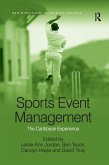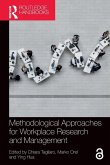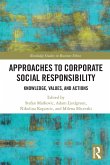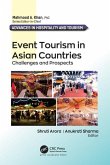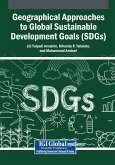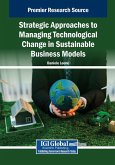Approaches and Methods in Event Studies
Herausgeber: Pernecky, Tomas
Approaches and Methods in Event Studies
Herausgeber: Pernecky, Tomas
- Broschiertes Buch
- Merkliste
- Auf die Merkliste
- Bewerten Bewerten
- Teilen
- Produkt teilen
- Produkterinnerung
- Produkterinnerung
This book challenges the reader to reach beyond the established modes of thinking about events by placing these phenomena against a backdrop of much wider, critical discourse.
Andere Kunden interessierten sich auch für
![Sports Event Management Sports Event Management]() Sports Event Management72,99 €
Sports Event Management72,99 €![Methodological Approaches for Workplace Research and Management Methodological Approaches for Workplace Research and Management]() Methodological Approaches for Workplace Research and Management73,99 €
Methodological Approaches for Workplace Research and Management73,99 €![Approaches to Corporate Social Responsibility Approaches to Corporate Social Responsibility]() Approaches to Corporate Social Responsibility55,99 €
Approaches to Corporate Social Responsibility55,99 €![Event Tourism in Asian Countries Event Tourism in Asian Countries]() Event Tourism in Asian Countries125,99 €
Event Tourism in Asian Countries125,99 €![Geographical Approaches to Global Sustainable Development Goals (SDGs) Geographical Approaches to Global Sustainable Development Goals (SDGs)]() Geographical Approaches to Global Sustainable Development Goals (SDGs)179,99 €
Geographical Approaches to Global Sustainable Development Goals (SDGs)179,99 €![Strategic Approaches to Managing Technological Change in Sustainable Business Models Strategic Approaches to Managing Technological Change in Sustainable Business Models]() Daniele LeoneStrategic Approaches to Managing Technological Change in Sustainable Business Models125,99 €
Daniele LeoneStrategic Approaches to Managing Technological Change in Sustainable Business Models125,99 €![Industry 4.0 Interoperability, Analytics, Security, and Case Studies Industry 4.0 Interoperability, Analytics, Security, and Case Studies]() Industry 4.0 Interoperability, Analytics, Security, and Case Studies73,99 €
Industry 4.0 Interoperability, Analytics, Security, and Case Studies73,99 €-
-
-
This book challenges the reader to reach beyond the established modes of thinking about events by placing these phenomena against a backdrop of much wider, critical discourse.
Produktdetails
- Produktdetails
- Verlag: Routledge
- Seitenzahl: 232
- Erscheinungstermin: 13. Dezember 2021
- Englisch
- Abmessung: 234mm x 156mm x 13mm
- Gewicht: 360g
- ISBN-13: 9781032242484
- ISBN-10: 1032242485
- Artikelnr.: 62950979
- Herstellerkennzeichnung
- Libri GmbH
- Europaallee 1
- 36244 Bad Hersfeld
- gpsr@libri.de
- Verlag: Routledge
- Seitenzahl: 232
- Erscheinungstermin: 13. Dezember 2021
- Englisch
- Abmessung: 234mm x 156mm x 13mm
- Gewicht: 360g
- ISBN-13: 9781032242484
- ISBN-10: 1032242485
- Artikelnr.: 62950979
- Herstellerkennzeichnung
- Libri GmbH
- Europaallee 1
- 36244 Bad Hersfeld
- gpsr@libri.de
Tomas Pernecky is with the Faculty of Culture and Society at the Auckland University of Technology, New Zealand. An advocate of post-disciplinary approaches to knowledge, his wide-ranging interests extend to examining a variety of philosophical, conceptual, theoretical and methodological issues. Examples include ontological inquiry into the constitution of social worlds through the phenomenon of events (e.g. Ideological, Social and Cultural Aspects of Events by CABI), sustainability-related concerns (e.g. Events, Society and Sustainability: Critical and Contemporary Approaches by Routledge) and the application of constructionist philosophy and hermeneutic phenomenology in tourism research. Tomas recently co-chaired the second Tourism Postdisciplinary Conference (Copenhagen, 22-24 June 2015) and co-edited a special issue on tourism post-disciplinarity for the journal Tourism Analysis.
What and when is an 'event': a short prelude to event studies
(Tomas Pernecky)
Part I Introduction
1. The epistemic foundations of event studies
(Tomas Pernecky)
Part II Articulating a broader philosophical, conceptual, and theoretical
vision for event studies
2. Evental approaches to the study of events
(Iain Mackenzie & Robert Porter)
3. Eventification: framing the Ordinary as the Extraordinary
(Temple Hauptfleisch)
4. The creative guerrilla: makers, organisation and belonging
(Welby Ings)
5. A mobilities approach to events
(Kevin Hannam)
PART III Towards critical capacity and methodological vigilance for the
study of events
6. Critical discourse analysis: towards critiquing the language of events
(William Feighery)
7. Visual methods in event studies
(Dennis Zuev)
8. Tourism and new collective effervescence: the encoding of
'Aboriginality' - a worldmaking critique of special events and special
places
(Keith Hollinshead & Rukeya Suleman)
9. Ethnography in the diaspora: Indian cultural production and
transnational networks
(Alison Booth)
10. Collapsing social distance with cake and tea: the influence of
Indigenous
methodologies
(Jared Mackley-Crump)
PART IV Conclusion
11. Events and the framing of peoples and places: acts of declarations/acts
of devilry
(Keith Hollinshead & Rukeya Suleman)
(Tomas Pernecky)
Part I Introduction
1. The epistemic foundations of event studies
(Tomas Pernecky)
Part II Articulating a broader philosophical, conceptual, and theoretical
vision for event studies
2. Evental approaches to the study of events
(Iain Mackenzie & Robert Porter)
3. Eventification: framing the Ordinary as the Extraordinary
(Temple Hauptfleisch)
4. The creative guerrilla: makers, organisation and belonging
(Welby Ings)
5. A mobilities approach to events
(Kevin Hannam)
PART III Towards critical capacity and methodological vigilance for the
study of events
6. Critical discourse analysis: towards critiquing the language of events
(William Feighery)
7. Visual methods in event studies
(Dennis Zuev)
8. Tourism and new collective effervescence: the encoding of
'Aboriginality' - a worldmaking critique of special events and special
places
(Keith Hollinshead & Rukeya Suleman)
9. Ethnography in the diaspora: Indian cultural production and
transnational networks
(Alison Booth)
10. Collapsing social distance with cake and tea: the influence of
Indigenous
methodologies
(Jared Mackley-Crump)
PART IV Conclusion
11. Events and the framing of peoples and places: acts of declarations/acts
of devilry
(Keith Hollinshead & Rukeya Suleman)
What and when is an 'event': a short prelude to event studies
(Tomas Pernecky)
Part I Introduction
1. The epistemic foundations of event studies
(Tomas Pernecky)
Part II Articulating a broader philosophical, conceptual, and theoretical
vision for event studies
2. Evental approaches to the study of events
(Iain Mackenzie & Robert Porter)
3. Eventification: framing the Ordinary as the Extraordinary
(Temple Hauptfleisch)
4. The creative guerrilla: makers, organisation and belonging
(Welby Ings)
5. A mobilities approach to events
(Kevin Hannam)
PART III Towards critical capacity and methodological vigilance for the
study of events
6. Critical discourse analysis: towards critiquing the language of events
(William Feighery)
7. Visual methods in event studies
(Dennis Zuev)
8. Tourism and new collective effervescence: the encoding of
'Aboriginality' - a worldmaking critique of special events and special
places
(Keith Hollinshead & Rukeya Suleman)
9. Ethnography in the diaspora: Indian cultural production and
transnational networks
(Alison Booth)
10. Collapsing social distance with cake and tea: the influence of
Indigenous
methodologies
(Jared Mackley-Crump)
PART IV Conclusion
11. Events and the framing of peoples and places: acts of declarations/acts
of devilry
(Keith Hollinshead & Rukeya Suleman)
(Tomas Pernecky)
Part I Introduction
1. The epistemic foundations of event studies
(Tomas Pernecky)
Part II Articulating a broader philosophical, conceptual, and theoretical
vision for event studies
2. Evental approaches to the study of events
(Iain Mackenzie & Robert Porter)
3. Eventification: framing the Ordinary as the Extraordinary
(Temple Hauptfleisch)
4. The creative guerrilla: makers, organisation and belonging
(Welby Ings)
5. A mobilities approach to events
(Kevin Hannam)
PART III Towards critical capacity and methodological vigilance for the
study of events
6. Critical discourse analysis: towards critiquing the language of events
(William Feighery)
7. Visual methods in event studies
(Dennis Zuev)
8. Tourism and new collective effervescence: the encoding of
'Aboriginality' - a worldmaking critique of special events and special
places
(Keith Hollinshead & Rukeya Suleman)
9. Ethnography in the diaspora: Indian cultural production and
transnational networks
(Alison Booth)
10. Collapsing social distance with cake and tea: the influence of
Indigenous
methodologies
(Jared Mackley-Crump)
PART IV Conclusion
11. Events and the framing of peoples and places: acts of declarations/acts
of devilry
(Keith Hollinshead & Rukeya Suleman)


